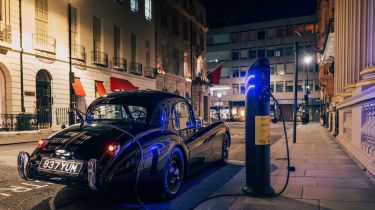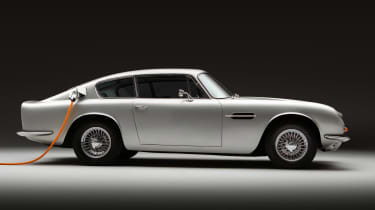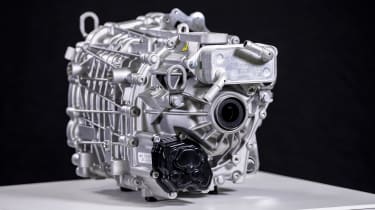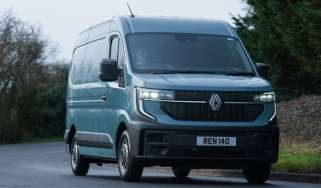Electric car conversions: how to make your own electric car
The idea of carrying out your own electric car conversion seems tempting, but there’s a lot you’ll need to know

Electric car conversions might seem like a recent phenomenon, but they've actually been around for quite some time. A standout example is Mate Rimac, founder of the Rimac electric supercar brand. Rimac first gained attention by converting a 1980s BMW 3 Series at home to run purely on electric power. His upgraded BMW went on to break multiple electric car world records, which helped build his reputation in the EV industry.
There are many reasons why you might want to convert a combustion-powered car to electric. Unlike a petrol or diesel engine, an electric motor produces all of its torque almost immediately, so a car converted to electric power could have much stronger acceleration than it did originally. Other big draws are the lower running costs and zero tailpipe emissions attributed to electric vehicles – and, if you decide to convert a classic car, you can combine its retro looks with the benefits of a modern electric powertrain.
At first, electric car conversions were very niche propositions, and were typically only carried out by a small number of classic car conversion specialists such as Lunaz, Everrati and Electrogenic. Today, you’ll find plenty more electric car conversion firms out there, though while some offer conversions for more modern cars like the previous-generation Land Rover Defender, most still focus more on classic vehicles.
Thankfully, there are now a number of companies that offer DIY electric car conversion kits, and the improved availability of battery modules, controllers and electric vehicle motors have made home-build conversion projects much more practical.
How much does it cost to build your own electric car?
Despite more budget-friendly EVs arriving in showrooms every year, the starting price of a new electric car is still a major stumbling block for many drivers who are considering taking the leap to electric power. Unfortunately, it's a similar story when looking at electric car conversions on old cars.
The price of a professional EV converted classic depends heavily on the amount of work required to not only revitalise the car but also fit the new components – such as renewing bodywork, updating the upholstery and don’t forget the cost of the brand new electric powertrain. All of that work is on top of the cost of buying the car in the first place.
That means, once you’ve factored in all the costs, a turnkey electric car conversion can cost anywhere from around £35,000 excluding VAT for a classic MINI from London Electric Cars, to hundreds of thousands for something more exotic. Prices for electric car conversions performed by specialists like Lunaz can even start from close to £1 million.
If you can’t fork out that much, an electric car conversion kit could be the more affordable alternative. Prices can vary, but an entry-level kit starts from just over £6,000 and into six figure territory for more elaborate setups, but with a growing number of companies offering these kits, the choice available is expanding.
Be aware, though, that it won’t be a simple job. If you have the use of a workspace and all the tools it is possible to carry out the electric car conversion yourself but only attempt it if you’re a trained technician or an experienced mechanic. The presence of complex electrical components that can pose a danger to yourself and others. If you don;t have the skillset for a DIY job, we would strongly advise that you get the help of an experienced mechanic if you plan to use a kit.

Electric car conversions: how do they work?
The premise of an electric car conversion is fairly simple, first you find a car, usually a classic of some kind, remove all the engine and fuel components and replace them with an electrical powertrain. This creates a car that still has the looks of a petrol car but the benefits of electrics, sounds simple right? Think again. As we’ve said, the actual process of doing so can be rather complicated.
First, you need to find a car to start with. Something light is ideal, as heavier cars will make your electric car slower and reduce its potential range. Ideally, you also need something that doesn’t have power steering or power-assisted brakes, as these are typically powered by the engine and require extra components to retain their function during an electric car conversion, so classic cars are ideal in this regard. Then you need to strip out anything engine-related: that means getting rid of the fuel tank, the exhaust, the engine, the starter motor, the radiator, the coolant tank, the fuel lines and several other components besides.
You will need to keep hold of the transmission, though, as you’ll need this to direct the power from an electric motor to the wheels. You’ll also need to make an ‘adaptor plate’ to line up the motor and the transmission, and source a ‘coupler’ to connect the motor’s rotary power to the transmission.
Then you’ll need to get hold of some battery cells. The minimum would be a stack of 12v batteries for a very basic electric car conversion, but for more power and capacity there are suppliers out there who can supply new lithium-ion cells, much like you’d find in modern EVs. An affordable alternative is using a ready-made battery from a cheap used electric car, such as a Nissan Leaf or Renault ZOE – a repurposed electric car battery will typically be cheaper to buy than a brand-new one, and you’ll help cut down on battery waste.
Regardless of this, do make sure that, like all components, the batteries are fastened and secured into place. Another key component is a controller: this controls the power running between the batteries and the electric motor. The higher the amperage, the faster and more efficient your converted electric car will be, so buy the best one you can afford.
Those are the main considerations. If you’re likely to drive when it’s cold, you may want to consider how to make up for the lack of a heater as a normal car uses excess engine heat to keep the interior warm when required. The same suppliers that specialise in batteries, motors and controllers can probably supply you with an electric heater, too.
Buying an electric car conversion kit
If you’re looking for a reputable source for the parts you will need for the electric car conversion, then there are a number of companies that will supply a full set of everything you’ll need. An example is the website everything-ev.com, they supply a range of electric car conversion kits suited for different sized cars. The different kits start from just over £6,000 for a basic, generic conversion kit and rise in cost depending on how heavy your vehicle is and if you go for a more tailored model-specific option.
Felten is another electric car conversion company that offers a range of kit options. These kits start from £15,000 and rise in cost up to £65,000 for more powerful performance specifications. The kits use Tesla motors and battery modules, and there are drop-in kits for classic MINIs, 964-series Porsche 911s and Land Rover Defenders. If you don’t need an off-the-shelf kit for your electric car conversion project, Felten also supplies plenty of EV components for you to cherry pick everything you need.
Electrogenic, the Oxford-based classic car conversion specialist, has created its own electrification kit for old Land Rover Defenders. For a little under £29,000, the kit includes a 52kWh battery pack that gets fitted under the bonnet and powers a 120bhp electric motor. The kit has been designed for working vehicles, particularly those in agriculture, with the Defender's original gearbox and all-wheel-drive system preserved during the conversion to ensure no loss in off-road capability.
Another option is the Swindon Powertrain Classic MINI kit, which is effectively the kit used by the British company in its Swind E Classic converted MINI. The package comprises an HPD E Powertrain system mounted to an original classic MINI front subframe featuring brackets specifically designed for this installation. It also includes purpose-designed inner CV joint housings that allow the fitting of standard MINI driveshaft assemblies and comes with a standard differential. You can also upgrade your kit with the optional extras of a limited-slip differential or a classic MINI speed sensor kit but these come at extra cost.
This can be used in isolation or in addition to a range of aftermarket Swindon Powertrain components such as a 12kWh battery pack, motor controller, on-board charger and DC-DC converter. Swindon describes it as being "suitable for classic-car enthusiasts, specialists or conversion businesses that want to electrify a classic MINI", and you’ll need £15,300 to get hold of everything you need, plus an additional £1,032 (excluding VAT) if you decide to get the optional limited-slip differential and £373.18 (excluding VAT) for the classic MINI speed sensor kit.
In November 2021, Ford announced that it would offer the motor used in its Mustang Mach-E electric SUV in 'crate' form (below) to enthusiasts and companies looking to carry out electric car conversions. Ford showcased its new electric crate motors by fitting two into a classic F-100 pickup that it called the 'F-100 Eluminator', which had a total of 480bhp and 860Nm of torque on tap. The electric motor is available to buy in the US from Ford Performance Parts for US$1,400 each (approximately £1,068 at the time of writing).
Do I need to fill out some paperwork?
In short, yes. The DVLA requires you to complete a long and convoluted process to register your newly converted electric car as a ‘radically altered vehicle’ before being allowed on public roads.
First, you must follow the DVLA’s instructions for registering a new vehicle, providing a ‘built-up vehicle inspection report’ (known as a V627/1 form), evidence of type approval if needed, the original vehicle’s registration certificate, receipts for any parts used in the electric car conversion, plus photographs of the vehicle.
A points system is used to determine what registration number your car will receive. You must qualify for at least eight of them on the DVLA’s parts list in order to keep the original registration number, and five of these points get awarded for having an unmodified chassis, monocoque or frame, while only one point is awarded for having its original engine. Further points are awarded for having the original suspension at the front and back (two points), axles (two points), transmission (two points) and steering assembly (two points).
If you fail to meet these criteria – or if you’ve welded two vehicles together as part of your conversion – you must gain type approval in order to earn a registration number prefixed with a ‘Q’. For this, you’ll need to go through the Individual Vehicle Approval (IVA) scheme, which involves having your vehicle inspected thoroughly at a DVSA-approved provider of ‘designated technical services’. You’ll also need to provide documents as evidence.
On top of all that, you’ll need to get a model report costing hundreds of pounds, and ensure that you fill in the correct application form. In short, an electric car conversion is a difficult process if you’re not confident or familiar with UK regulations and procedures.
Can someone convert an electric car for me?
Yes, there is a growing number of companies that specialise in converting electric cars due to the increase in popularity of the concept of electrifying automotive icons. However, as previously mentioned, those companies tend to focus mainly on classic and high-performance cars and can be quite pricey.
For example, Oxford-based conversion specialist Electrogenic has created zero-emissions versions of everything from the classic MINI to the DeLorean DMC-12 and these start from £16,600 plus VAT. The company also offers packages for the classic Jaguar E-Type, however, these start from £54,000 and quickly rise to £80,000. Plus, those figures don’t include a donor vehicle or VAT.
Everrati is a similar company that focuses on "upgrading glamorous vehicles from the past with electric powertrains and a compassionate makeover". One of its higher-end models is a 500bhp pure-electric Porsche 964 generation 911 with a widebody kit that’s capable of 0-62mph in less than four seconds. It starts at £290,000 before taxes.
Everrati also produces an all-electric GT40 MKII, made in partnership with Superformance LLC, and is currently the only authentic EV GT40 on the market. This allows the GT40 to appear on both the World Shelby and GT40 registers and hold a GT40/p chassis number, something that is only allowed for cars approved by Shelby America. The EV GT40 has 789bhp and 800Nm of torque and can also achieve a sub-4 second 0-62 time.
Even mainstream brands like Aston Martin and MINI have also started offering similar packages so customers can have electric versions of their historic models.
Recommended

EV Deal of the Day: Dacia Spring is amazingly good value at £116 per month

EV Deal of the Day: budget-friendly Ford Capri for just £234 a month
Most Popular

EV Deal of the Day: Dacia Spring is amazingly good value at £116 per month



